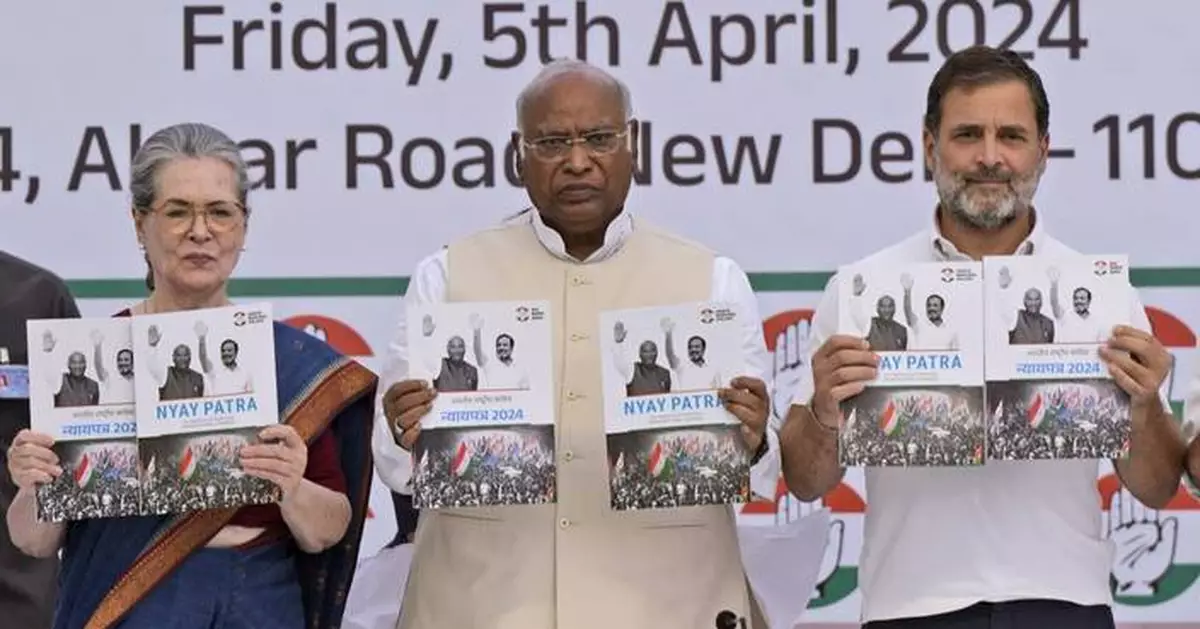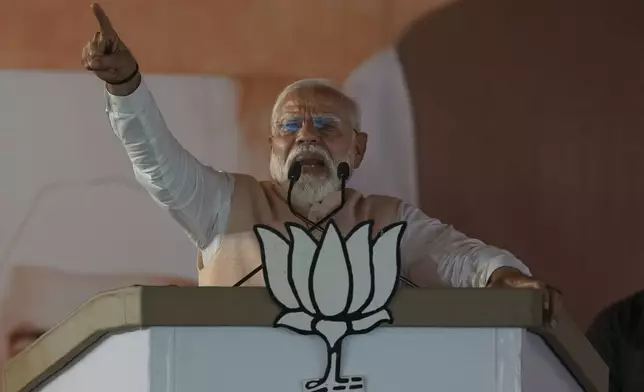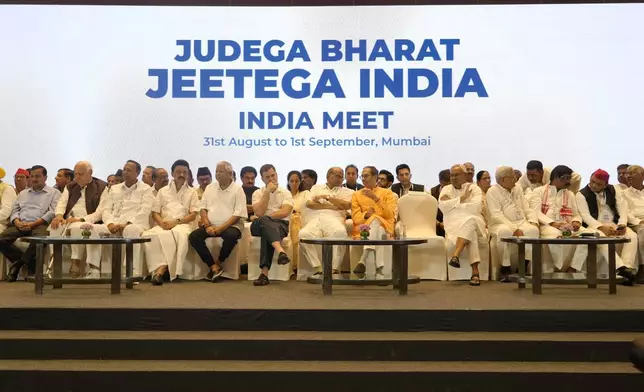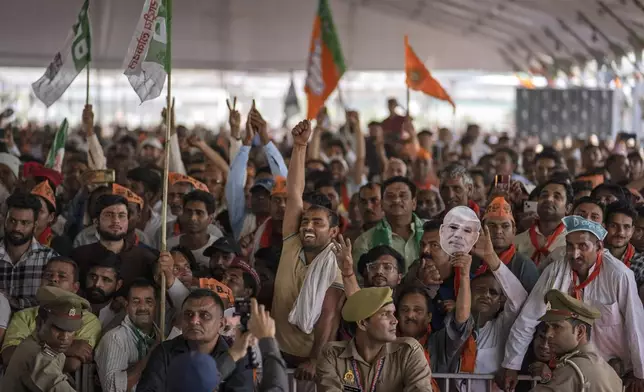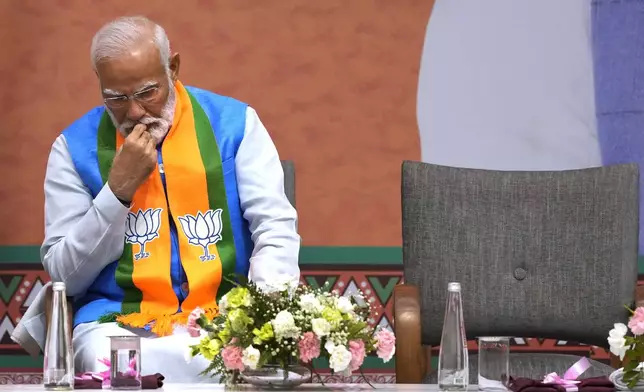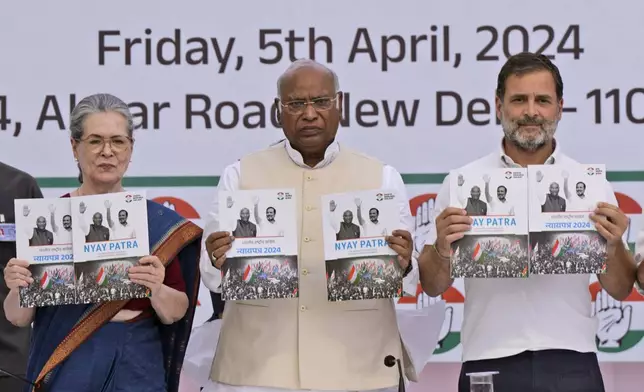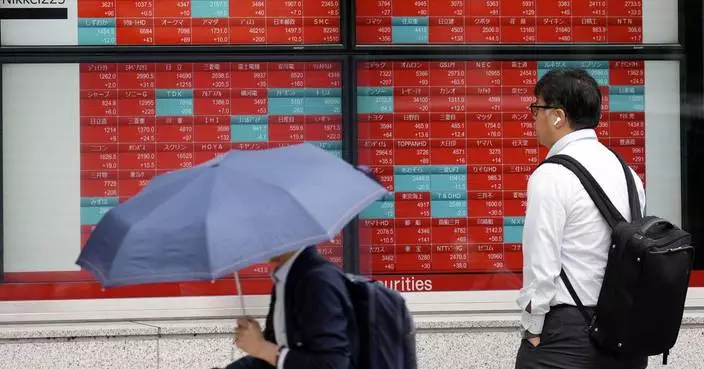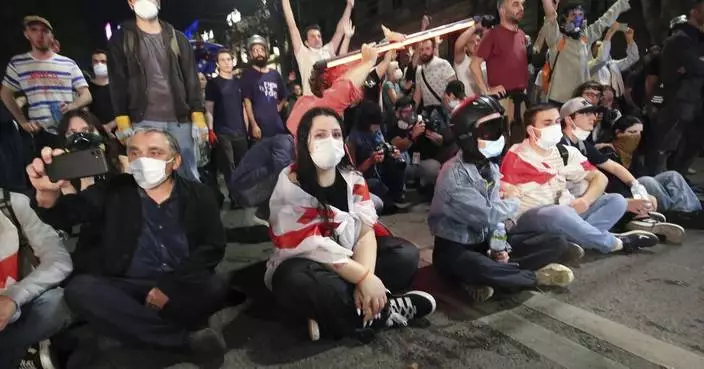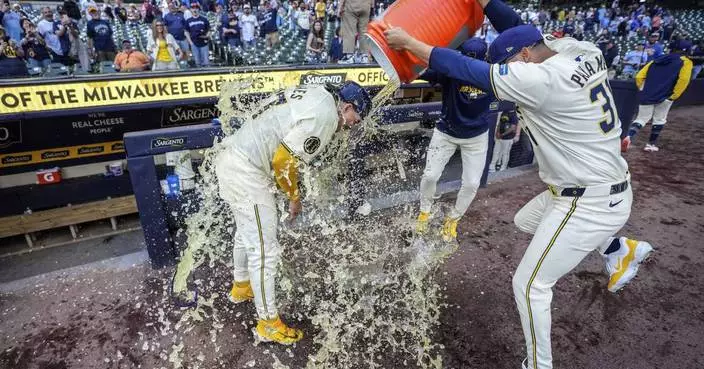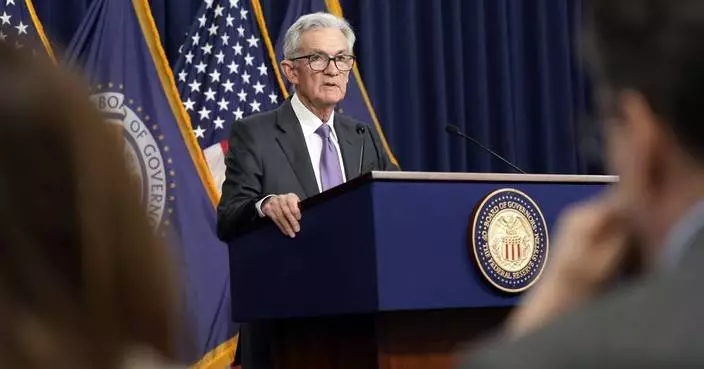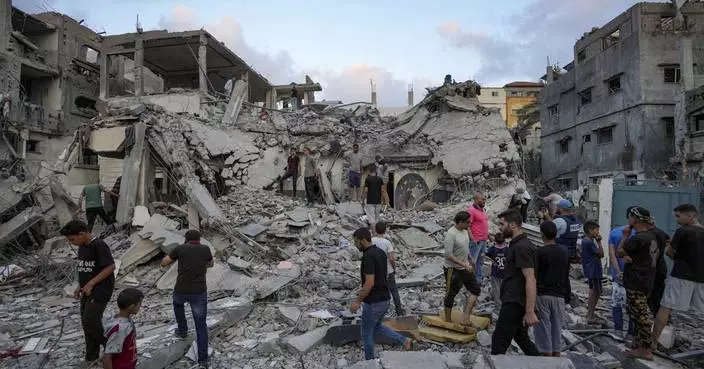NEW DELHI (AP) — Nearly 970 million people — or over 10% of the global population — are eligible to vote in India's general elections that start Friday and last to June 1. The mammoth exercise is the biggest anywhere in the world and will take 44 days before results are announced on June 4.
Prime Minister Narendra Modi is seeking a third successive term. He will face off against a broad but flailing alliance of opposition parties that are struggling to challenge his appeal. Most surveys predict Modi’s Hindu nationalist Bharatiya Janata Party will win comfortably, cementing him as one of the country’s most popular and consequential leaders.
Click to Gallery
NEW DELHI (AP) — Nearly 970 million people — or over 10% of the global population — are eligible to vote in India's general elections that start Friday and last to June 1. The mammoth exercise is the biggest anywhere in the world and will take 44 days before results are announced on June 4.
FILE- Newly elected lawmakers from India's ruling alliance led by the Hindu nationalist Bharatiya Janata Party raise their hands in support of Narendra Modi being elected their leader in New Delhi, India, May 25, 2019. India's 6-week-long general elections begin on April 19, 2024, and results will be announced on June 4. The voters, who comprise over 10% of the world's population, will elect 543 members for the lower house of Parliament for a term of five years. (AP Photo/Manish Swarup, File)
FILE- Leaders from the opposition INDIA alliance sit for a press briefing in Mumbai, India, Friday, Sept. 1, 2023. The opposition has united under a front called INDIA. The acronym, which stands for Indian National Developmental Inclusive Alliance, comprises India’s previously fractured opposition parties that are aiming to deny Modi a third straight win in the 2024 elections. (AP Photo/Rajanish Kakade, File)
Bharatiya Janata Party (BJP) supporters wear masks of Indian Prime Minister Narendra Modi during an election rally addressed by Modi in Meerut, India, Sunday, March 31, 2024. (AP Photo/Altaf Qadri)
FILE- Supporters of India's ruling Bharatiya Janata Party (BJP) react as they listen to Indian Prime Minister Narendra Modi speak at an election rally in Meerut, India, March 31, 2024. (AP Photo/Altaf Qadri, File)
FILE- Indian Prime Minister Narendra Modi listens to Bharatiya Janata Party (BJP) President JP Nadda speak during an event organized to release their party's manifesto for the upcoming national parliamentary elections in New Delhi, India, Sunday, April 14, 2024. (AP Photo/Manish Swarup, File)
FILE- India’s opposition Congress party leaders from left, Sonia Gandhi, Mallikarjun Kharge, and Rahul Gandhi, display copies of party’s election manifesto during a press conference in New Delhi, India, April 5, 2024. India's 6-week-long general election starts on April 19 and results will be announced on June 4. (AP Photo/Manish Swarup, File)
It boils down to two key reasons: the sheer size of India, the world’s most populous country, and the astonishing level of logistics needed to ensure that every registered voter is able to cast their ballot.
Over the years, the duration of voting has wavered. It took nearly four months to complete the vote in India’s first elections in 1951-1952, after it gained independence from British rule, and just four days in 1980. In 2019, voting took 39 days, and this year’s election is the second longest.
With 969 million registered voters, the size of India’s electorate is bigger than the combined population of the 27 European Union member states. This includes 18 million first-time voters, and around 197 million who are in their 20s.
The vote to choose 543 lawmakers for the lower house of Parliament takes place over seven phases. India’s 28 states and eight federal territories will vote at different times. Each phase is one day, with the first held on April 19 and the last on June 1.
While some states will cast their ballots in a day, voting elsewhere may take longer. The largest state, Uttar Pradesh, which is the size of Brazil with 200 million people, will vote on all seven days, for example.
General elections in India tend to take weeks to conduct, but Modi’s opponents also say it gives him an advantage as it makes it easier for the prime minister, the public face of the BJP, to travel and campaign, especially in states where they are weak.
The Election Commission of India, which oversees the vote, has to make sure there is a voting booth available within 2 kilometers (1.2 miles) of every voter.
"Election officials have to travel to great lengths to ensure that even a single voter can exercise their franchise,” said Chakshu Roy of PRS Legislative Research, an independent think tank.
Some 15 million election officials and security staff will traverse the country’s deserts and mountains — sometimes by boat, foot and even on horseback — to try to reach every voter.
It can be especially arduous. In 2019, when India last held elections, a team of polling officers trekked over 480 kilometers (300 miles) for four days just so a single voter in a hamlet in the remote state of Arunachal Pradesh, which borders China, could exercise their right.
Officials also traveled to a village tucked away high up in the Himalayas in 2019 to install a booth at 15,256 feet (4,650 meters), the highest polling station anywhere in the world.
This time too, polling stations will be installed in remote places, including one inside a wildlife sanctuary in southern Kerala state and another in a shipping container in western Gujarat state.
Experts say a key reason behind the multiphase elections in India is about security.
Tens of thousands of federal security forces, who usually guard borders for instance, are freed up and deployed alongside state police to prevent violence and transport electoral officials and voting machines.
Deadly clashes involving supporters of rival political parties, particularly in the eastern state of West Bengal, had marred previous elections. But such violence has tapered over the years, thanks to heavy security, and voting has been relatively peaceful.
“Look at the geography of the country … there are rivers, mountains, snow, jungles … think of the security forces’ movements. They will have to travel through the length and breadth of the country,” Rajiv Kumar, the chief election commissioner, said on Saturday. “We will walk the extra mile so voters don’t have to.”

Indian Prime Minister Narendra Modi speaks at an election campaign rally in Meerut, India, Sunday, March 31, 2024. (AP Photo/Altaf Qadri)
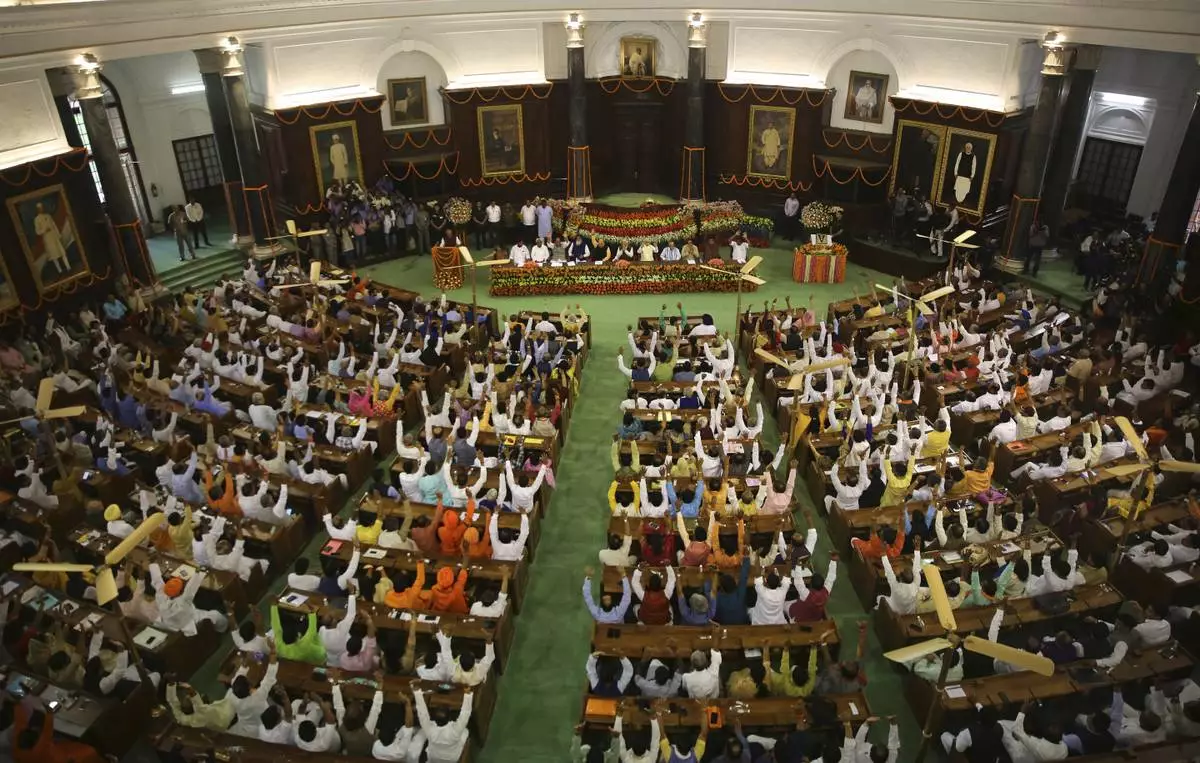
FILE- Newly elected lawmakers from India's ruling alliance led by the Hindu nationalist Bharatiya Janata Party raise their hands in support of Narendra Modi being elected their leader in New Delhi, India, May 25, 2019. India's 6-week-long general elections begin on April 19, 2024, and results will be announced on June 4. The voters, who comprise over 10% of the world's population, will elect 543 members for the lower house of Parliament for a term of five years. (AP Photo/Manish Swarup, File)

FILE- Leaders from the opposition INDIA alliance sit for a press briefing in Mumbai, India, Friday, Sept. 1, 2023. The opposition has united under a front called INDIA. The acronym, which stands for Indian National Developmental Inclusive Alliance, comprises India’s previously fractured opposition parties that are aiming to deny Modi a third straight win in the 2024 elections. (AP Photo/Rajanish Kakade, File)
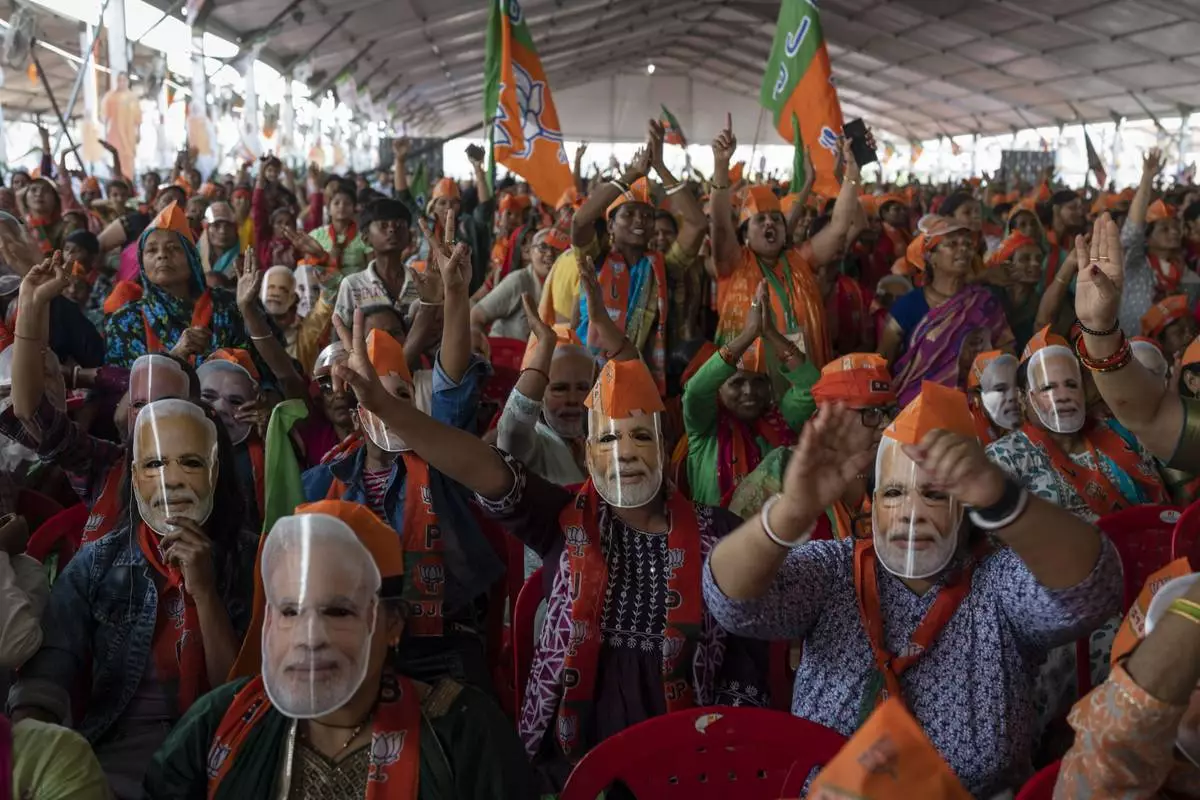
Bharatiya Janata Party (BJP) supporters wear masks of Indian Prime Minister Narendra Modi during an election rally addressed by Modi in Meerut, India, Sunday, March 31, 2024. (AP Photo/Altaf Qadri)

FILE- Supporters of India's ruling Bharatiya Janata Party (BJP) react as they listen to Indian Prime Minister Narendra Modi speak at an election rally in Meerut, India, March 31, 2024. (AP Photo/Altaf Qadri, File)

FILE- Indian Prime Minister Narendra Modi listens to Bharatiya Janata Party (BJP) President JP Nadda speak during an event organized to release their party's manifesto for the upcoming national parliamentary elections in New Delhi, India, Sunday, April 14, 2024. (AP Photo/Manish Swarup, File)

FILE- India’s opposition Congress party leaders from left, Sonia Gandhi, Mallikarjun Kharge, and Rahul Gandhi, display copies of party’s election manifesto during a press conference in New Delhi, India, April 5, 2024. India's 6-week-long general election starts on April 19 and results will be announced on June 4. (AP Photo/Manish Swarup, File)
MEXICO CITY (AP) — Volunteer searchers said they have found a clandestine crematorium on the edge of Mexico City, though it was unclear if evidence found at the scene would back up that claim.
It's the first time in recent memory that anyone claimed to have found such a body disposal site in the capital. In northern Mexico, drug cartels often use drums filled with diesel or caustic substances to burn or dissolve bodies, but up to now there has been little evidence of that in Mexico City.
Ceci Flores, a leader of one of the groups of so-called “searching mothers” from northern Mexico, announced on social media late Tuesday her team had found bones around a charred pit on the outskirts of the city.
Flores said the team had found bones, clandestine burial pits and ID cards at the site in a rural area of the city’s south side.
Ulises Lara, Mexico City's chief prosecutor, later said police went to the addresses listed on the cards and “found that both of the people to whom those cards belonged are alive and in good health.”
Lara said one of them, a woman, said her card and cell phone and had been stolen about a year ago, when thieves snatched her phone and ID card from her hands while she was stuck in traffic.
While that ruled out the possibility the woman's body could had been dumped there, it did suggest that criminals had used the site to dispose of evidence.
Lara said experts were investigating to determine the nature of the remains found, and whether they were human. The prosecutors office said it was also reviewing security camera footage and looking for possible witnesses.
The discovery, if confirmed, would be a political embarrassment for the ruling party, which has long governed Mexico City and claims the capital has been spared much of the drug cartel violence that afflicts other parts of the country.
That is largely due to the city's dense population, notoriously snarled traffic, extensive security camera network and large police force, which presumably make it hard for criminals to act in the same way they do in provincial areas.
But while the city is home to 9 million residents and the greater metropolitan area holds around 20 million, large parts of the south side are still a mix of farms, woods and mountains. In those areas, it is not unheard of for criminals to dump the bodies of kidnapping victim, but they seldom burn or bury them.
Volunteer searchers like Flores often conduct their own investigations, sometimes relying on tips from former criminals, because the government has been unable to help. The searchers have been angered by a government campaign to “find” missing people by checking their last known address, to see if they have returned home without advising authorities.
Activists claim that is just an attempt to reduce the politically embarrassing figures on the missing.
The searchers, mostly the mothers of the disappeared, usually aren’t trying to convict anyone for their relatives’ abductions. They say they just want to find their remains.
The Mexican government has spent little on looking for the missing. Volunteers must stand in for nonexistent official search teams in the hunt for clandestine graves where cartels hide their victims. The government hasn’t adequately funded or implemented a genetic database to help identify the remains found.
Victims’ relatives rely on anonymous tips, sometimes from former cartel gunmen, to find suspected body-dumping sites. They plunge long steel rods into the earth to detect the scent of death.
If they find something, the most authorities will do is send a police and forensics team to retrieve the remains, which in most cases are never identified. But such systematic searches have been rare in Mexico City.
At least seven of the activists searching for some of Mexico’s more than 100,000 missing people have been killed since 2021.

A member of the Mexico City Search Commission digs in an area where search volunteers said they found a clandestine crematorium in Tlahuac, on the edge of Mexico City, Wednesday, May 1, 2024. Ceci Flores, a leader of one of the groups of so-called "searching mothers" from northern Mexico, announced late Tuesday that her team had found bones around clandestine burial pits and ID cards, and prosecutors said they were investigating to determine the nature of the remains. (AP Photo/Ginnette Riquelme)
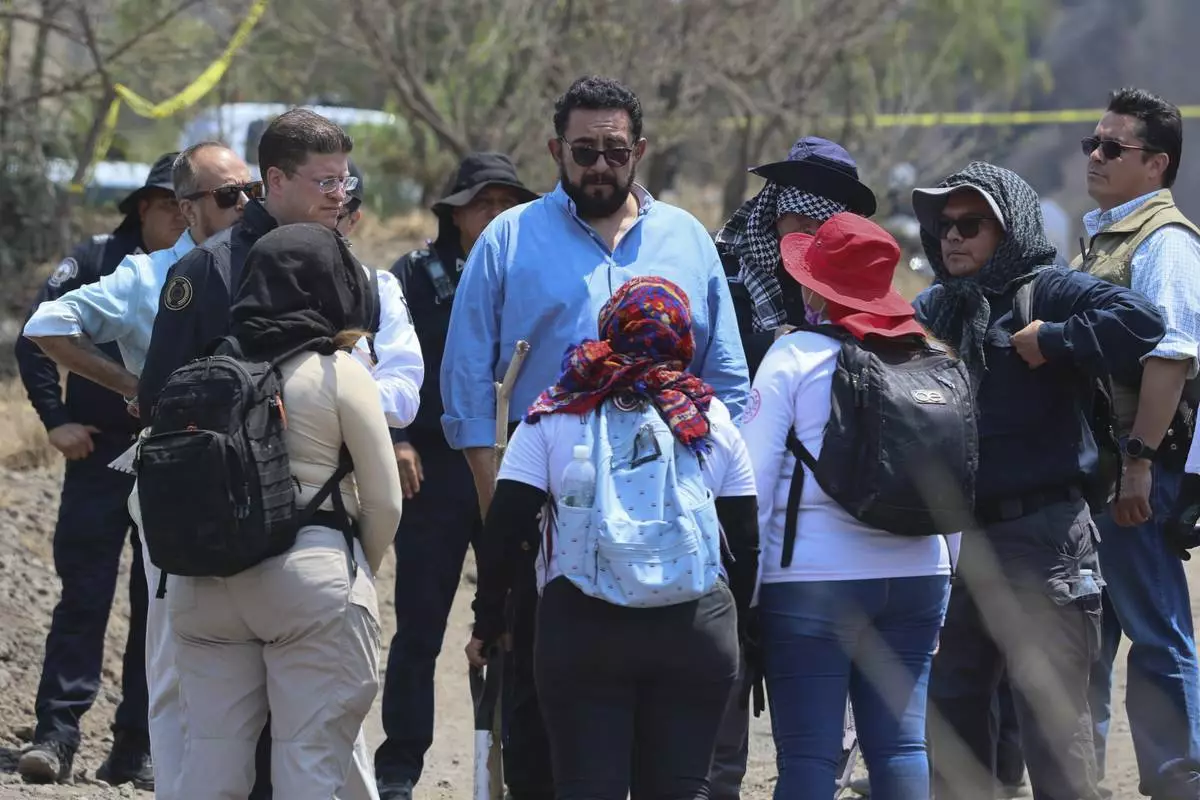
Mexico City interim Prosecutor Ulises Lara speaks with the mothers of missing children at the site where volunteer searchers said they found a clandestine crematorium in Tlahuac, on the edge of Mexico City, Wednesday, May 1, 2024. Ceci Flores, a leader of one of the groups of so-called "searching mothers" from northern Mexico, announced late Tuesday that her team had found bones around clandestine burial pits and ID cards, and prosecutors said they were investigating to determine the nature of the remains found. (AP Photo/Ginnette Riquelme)

A police officer escorts women carrying digging tools at the site where a clandestine crematorium was found in Tlahuac, on the edge of Mexico City, Wednesday, May 1, 2024. Third from right is Jacqueline Palmeros who has been searching for her disappeared daughter since 2020 in Mexico City, and second from right is María de Jesús Soria whose daughter disappeared in Veracruz in 2016, and whose remains were turned over to her in 2022. (AP Photo/Ginnette Riquelme)

National Guards stand at the site where volunteer searchers said they found a clandestine crematorium in Tlahuac, on the edge of Mexico City, Wednesday, May 1, 2024. Ceci Flores, a leader of one of the groups of so-called "searching mothers" from northern Mexico, announced late Tuesday that her team had found bones around clandestine burial pits and ID cards, and prosecutors said they were investigating to determine the nature of the remains found. (AP Photo/Ginnette Riquelme)
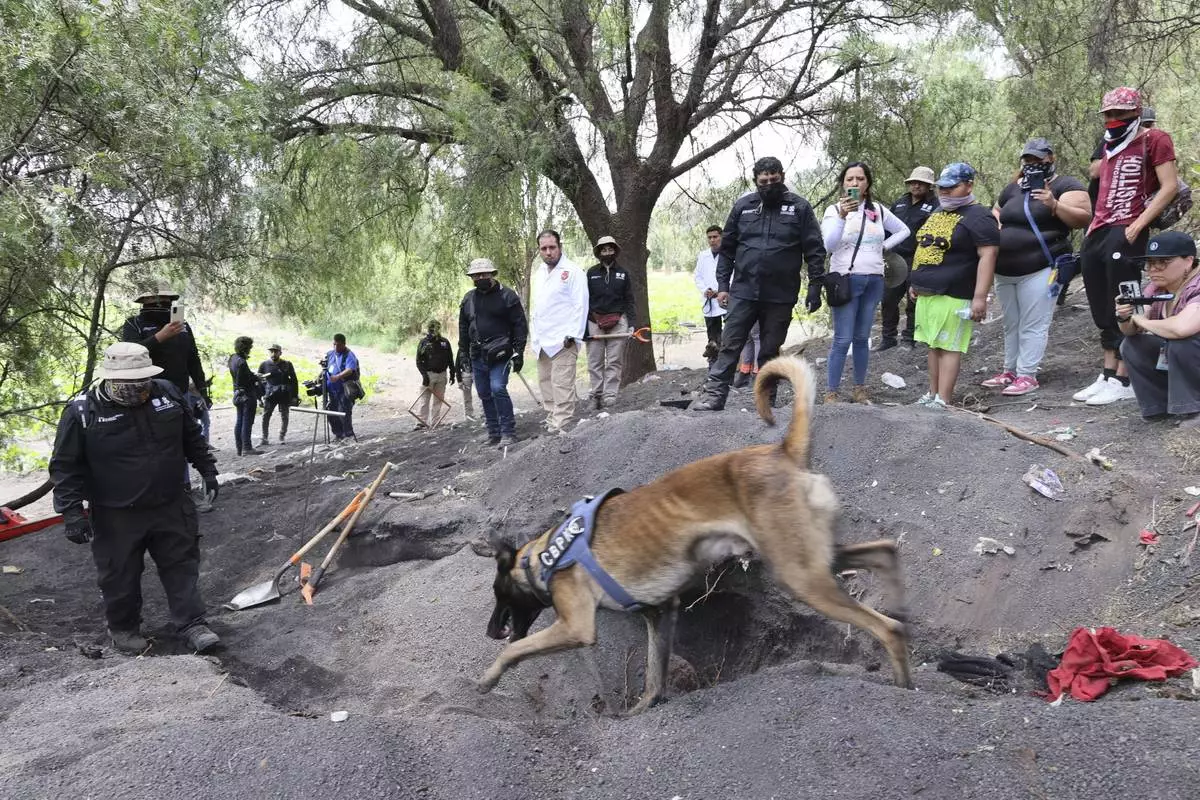
A search dog from the Mexico City Search Commission named Argos searches in an area where search volunteers said they found a clandestine crematorium in Tlahuac, on the edge of Mexico City, Wednesday, May 1, 2024. Ceci Flores, a leader of one of the groups of so-called "searching mothers" from northern Mexico, announced late Tuesday that her team had found bones around clandestine burial pits and ID cards, and prosecutors said they were investigating to determine the nature of the remains. (AP Photo/Ginnette Riquelme)

Women holding digging tools stand at the site where a clandestine crematorium was found, as the press and police stand by in Tlahuac, on the edge of Mexico City, Wednesday, May 1, 2024. A leader of one of the groups of so-called "searching mothers" from northern Mexico, announced late Tuesday that her team had found bones around clandestine burial pits and ID cards, and prosecutors said they were investigating to determine the nature of the remains. (AP Photo/Ginnette Riquelme)

A member of the Mexico City Search Commission uses a ground-penetrating radar in an area where volunteers said they have found a clandestine crematorium in Tlahuac, on the edge of Mexico City, Wednesday, May 1, 2024. Ceci Flores, a leader of one of the groups of so-called "searching mothers" from northern Mexico, announced late Tuesday that her team had found bones around clandestine burial pits and ID cards, and prosecutors said they were investigating to determine the nature of the remains. (AP Photo/Ginnette Riquelme)
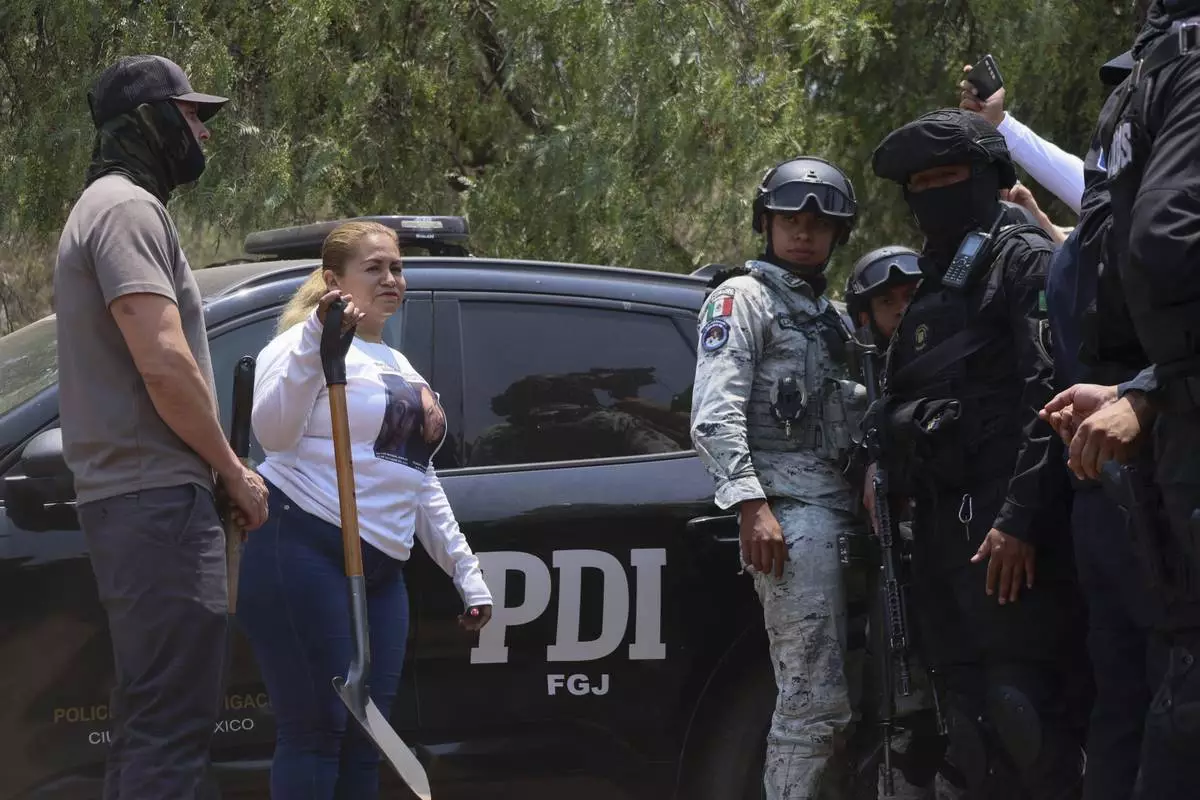
Ceci Flores, leader of a "searching mothers" group from northern Mexico, arrives with a shovel at the site where she said her team found a clandestine crematorium in Tlahuac, on the edge of Mexico City, Wednesday, May 1, 2024. Flores announced late Tuesday that her team had found bones around clandestine burial pits and ID cards, and prosecutors said they were investigating to determine the nature of the remains. At left is activist Bryan Lebaron. (AP Photo/Ginnette Riquelme)

Police stand by as members of the National Search Commission use rakes to search an area where volunteers said they found a clandestine crematorium in Tlahuac, on the edge of Mexico City, Wednesday, May 1, 2024. Ceci Flores, a leader of one of the groups of so-called "searching mothers" from northern Mexico, announced late Tuesday that her team had found bones around clandestine burial pits and ID cards, and prosecutors said they were investigating to determine the nature of the remains found. (AP Photo/Ginnette Riquelme)
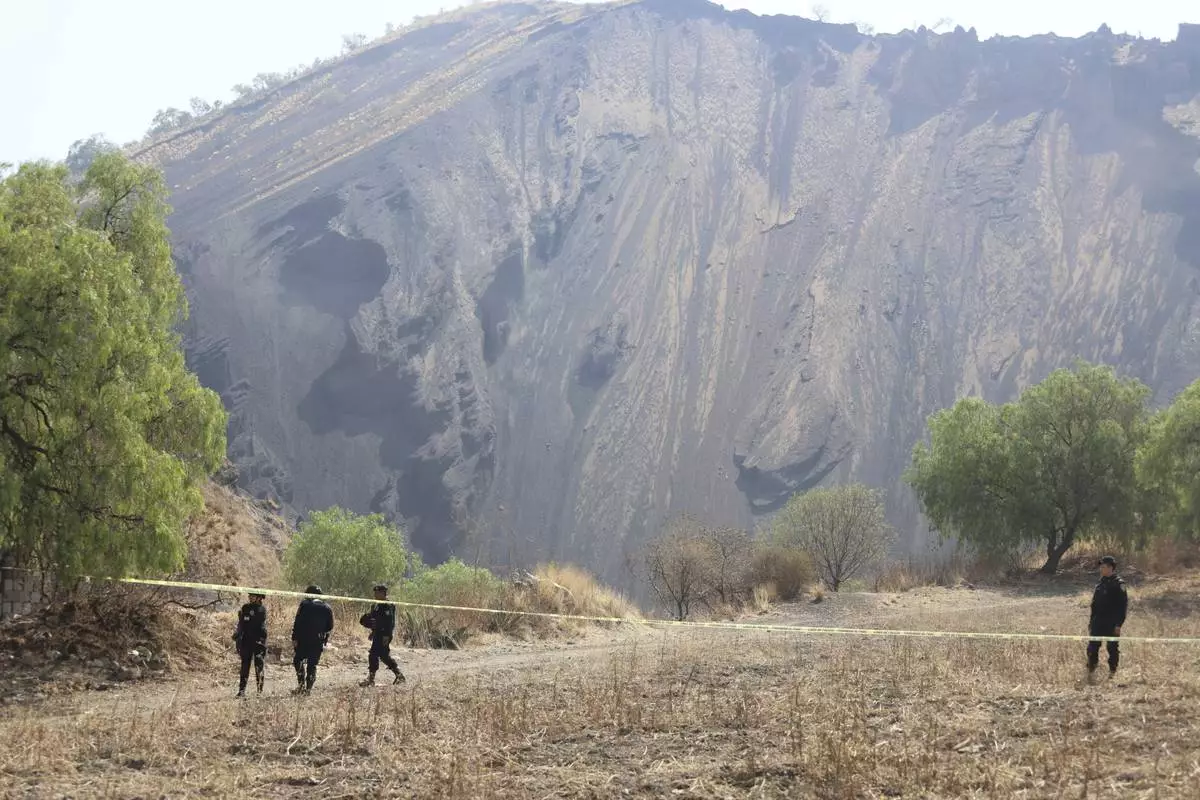
Police stand guard in an area where volunteers said they found a clandestine crematorium in Tlahuac, on the edge of Mexico City, Wednesday, May 1, 2024. Ceci Flores, a leader of one of the groups of so-called "searching mothers" from northern Mexico, announced late Tuesday that her team had found bones around clandestine burial pits and ID cards, and prosecutors said they were investigating to determine the nature of the remains found. (AP Photo/Ginnette Riquelme)

Police tape off the area where volunteers said they have found a clandestine crematorium in Tlahuac, on the edge of Mexico City, Wednesday, May 1, 2024. Ceci Flores, a leader of one of the groups of so-called "searching mothers" from northern Mexico, announced late Tuesday that her team had found bones around clandestine burial pits and ID cards, and prosecutors said they were investigating to determine the nature of the remains found. (AP Photo/Ginnette Riquelme)

Women carry digging tools where they found a clandestine crematorium in Tlahuac, on the edge of Mexico City, Wednesday, May 1, 2024. Ceci Flores, a leader of one of the groups of so-called "searching mothers" from northern Mexico, announced late Tuesday that her team had found bones around clandestine burial pits and ID cards, and prosecutors said they were investigating to determine the nature of the remains found. (AP Photo/Ginnette Riquelme)

A member of the National Search Commission uses a ground-penetrating radar in an area where volunteers said they have found a clandestine crematorium in Tlahuac, on the edge of Mexico City, Wednesday, May 1, 2024. Ceci Flores, a leader of one of the groups of so-called "searching mothers" from northern Mexico, announced late Tuesday that her team had found bones around clandestine burial pits and ID cards, and prosecutors said they were investigating to determine the nature of the remains found. (AP Photo/Ginnette Riquelme)









